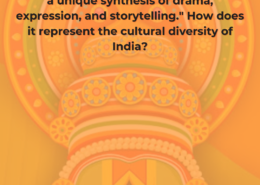A judicial innovation is the Indian Constitution’s basic structural theory. Examine. (Answer 200 words)
Answer: The Pravasi Bhartiya Divas is a celebratory day observed on 9th January (which commemorates the return of Mahatma Gandhi from South Africa to Mumbai) to mark the contribution of the overseas Indian community towards the development of India. Its 2023 theme 'Diaspora: Reliable partners for InRead more
Answer: The Pravasi Bhartiya Divas is a celebratory day observed on 9th January (which commemorates the return of Mahatma Gandhi from South Africa to Mumbai) to mark the contribution of the overseas Indian community towards the development of India. Its 2023 theme ‘Diaspora: Reliable partners for India’s progress in Amrit Kaal’ reflects how the Indian diaspora is acting as a soft power/ ‘rashtradoot’ for India. It is held that the event can create new possibilities and ideas and can act as a network to drive change and discover new ties in the following ways:
- Innovations and new technologies: Indian Americans constitute a significant proportion of innovators, angel funders, and start-ups in Silicon Valley, which is home to companies like Google, Facebook, and Apple. They can aid in India’s development, especially with regard to the promotion of start-ups.
- Promoting the Indian healthcare ecosystem: The diaspora can help to promote India as a healthcare destination, linking hospitals and universities with India to facilitate the sharing of best medical practices and contribute to the pharmaceutical industry’s expansion and growth.
- Leveraging the soft power of India: Goodwill through craft, cuisine, and creativity can create a seamless two-way flow of ideas between the diaspora counterparts from around the world.
- Enabling the global mobility of the Indian workforce: The Indian IT industry has created a strong motivation for the mobility of highly skilled professionals and has provided the diaspora with the much-needed opportunity to engage with India.
- Harnessing the potential of women diaspora entrepreneurs towards an inclusive approach to nation-building: Female participants like Dr. Poonam Gupta (founder of PG Papers, Scotland for recycling waste paper) can motivate young women to lead various fields, promote inclusion, and strengthen SHGs.
However, several challenges need to be addressed to encourage this partnership, such as:
- Less attractive to youth diaspora: Young diaspora who are born in the US and grew up there find the Indian lifestyle challenging and are less likely to return to India to start businesses.
- Limited capital resources: The profile of the Indian diaspora varies from the blue-collar workers in the Gulf to professionals in Silicon Valley. Even in the US, the diaspora does not contribute substantially in terms of capital resources to India’s development.
- Perceived bias in approach: Conventions such as the ‘Pravasi Bharatiya Sammelan’ appear to be leaving out low/semi-skilled and blue-collar workers who may not find a place or feel. comfortable to participate in the said celebration as the general profile of the participants is seen to be that of achievers in distinct fields.
- Skill demand and supply match: There are changing demand patterns related to the kind of skills and professional qualifications that different countries will need over the next decade. India has to enable the dispora to learn these skills. In this regard, the government of India has taken several initiatives like the Know India Programme, GIAN (Global Initiative for Academic Network), VAJRA Faculty Scheme, Mission Shodh GANGA (Global Alliance for New Generation Acceleration), etc. to harness the energy and ideas of our diaspora.



The Doctrine of Basic Structure, a defining feature of Indian judicial innovation, guarantees the preservation of the fundamental tenets of the Indian Constitution even when it is amended. The theory guarantees that the essence of the Constitution is preserved while managing the intricate relationshRead more